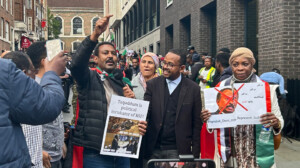Minister of Finance: Sanctions against Sudan will not be lifted within a year
Minister of Finance Ibrahim El Badawi announced that it is not possible that the economic sanctions against Sudan will be lifted within a year. During a press briefing yesterday, he said that Prime Minister Abdallah Hamdouk will seek $ 2 billion in support from the World Bank.
 Minister of Finance Ibrahim El Badawi (SUNA)
Minister of Finance Ibrahim El Badawi (SUNA)
Minister of Finance Ibrahim El Badawi announced that it is not possible that the economic sanctions against Sudan will be lifted within a year. During a press briefing yesterday, he said that Prime Minister Abdallah Hamdouk will seek $ 2 billion in support from the World Bank.
Badawi stressed that the transitional government will launch a nine-month economic rescue plan, in order to stabilise the economy.
He pointed out that the economic measures of the government will include rationalisation of spending and addressing inflation. He also said that subsidies for bread and petrol will exist until June 2020. He announced wage increases and institutional reform in the second half of 2020.
Stolen money
Badawi also announced the formation of a task force to return stolen money abroad back to Sudan. He has been promised help by the United Nations and other organisations. Next week Badawi will also set up an deposit account for the Sudanese diaspora.
Meanwhile, experts have warned of the consequences of the difficult living conditions suffered by the Sudanese at this moment. They point at the high cost of commodities, and the scarcity of fuel, flour, and bread.

Bread
The demonstration in Nyala that was violently broken up by the police on Sunday started as a protest against the soaring bread prices. Demonstrations against rising bread prices took place in West Darfur and Khartoum as well.
Sudanese activists and experts have warned that remnants of the former regime can take advantage of these rallies and demonstrations.
Owners of bakeries have attributed the return of the bread crisis to the scarcity of gas for their bakeries and a decrease in the supply of flour from milling companies.
A senior official at the Ministry of Energy and Mining accused elements of the 'deep state' of causing the current fuel crisis by causing disruptions between the ministry and distribution companies.
Medicines
A number of patients and their families complained about the large increases in the prices of medicines, especially for diabetes, malaria, and high blood pressure.
The price of isuline has risen from SDG 114 to SDG 1200 ($ 27*) and malaria medicine from SDG 100 to SDG 500 ($ 11).
* As effective foreign exchange rates can vary widely in Sudan, Radio Dabanga bases all SDG currency conversions on the daily US Dollar rate quoted by the Central Bank of Sudan (CBoS)
Radio Dabanga’s editorial independence means that we can continue to provide factual updates about political developments to Sudanese and international actors, educate people about how to avoid outbreaks of infectious diseases, and provide a window to the world for those in all corners of Sudan. Support Radio Dabanga for as little as €2.50, the equivalent of a cup of coffee.












 and then
and then